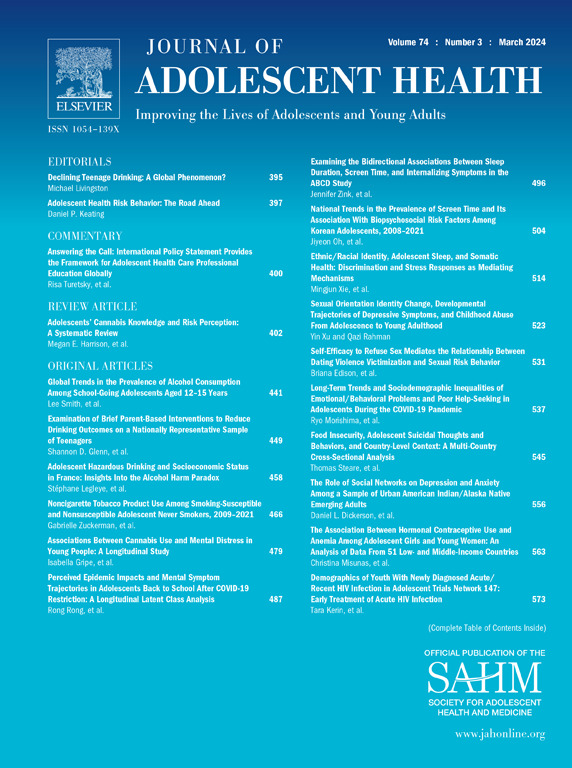Guidelines on the Inclusion and Protection of Adolescent Minors and Young Adults in Health Research: A Position Statement of the Society for Adolescent Health and Medicine
IF 5.5
2区 医学
Q1 PEDIATRICS
引用次数: 0
Abstract
These guidelines aim to assist researchers and research ethics committees/institutional review boards in the ethical conduct of health research with adolescents and young adults (AYA), particularly research with adolescent minors. Inclusion of AYA in research and protection from research harms are essential if, as individuals and as a group, they are to receive the benefits of research. The ethical principles of respect for persons, beneficence, and justice, the human rights concepts of best interests and emerging capacity, and the concept of appropriate inclusion collectively provide an ethical framework for evaluating the circumstances within which adolescent minors can and should be involved as research participants. Likewise, legal concepts guiding informed consent in health-care practice—age of majority, emancipation, mature minor, and minor consent—provide an important conceptual basis for informed consent with adolescents in health research. Consent processes in adolescent health research should be based on scientific understandings of AYA cognitive, psychological, and social development; the weight of current scientific evidence suggests that capacity to provide informed consent for research is present by the age of 14 years. When adolescent minors consent for themselves (i.e., autonomously or independent of parents/guardians), procedures should be in place to assess and support their desire for advice from parents and other trusted adults. Researchers should involve AYA in the codesign of research and should involve community members, parents, and AYA in the development of research priorities and questions, to ensure that research is relevant to AYA, to protect privacy and confidentiality, to facilitate the dissemination of research findings, and to promote translation of research into practice. Research with AYA should never reinforce stigma and discrimination of AYA or the groups to which they belong.
关于将未成年青少年和青年纳入和保护健康研究的准则:青少年健康和医学学会的立场声明。
这些准则的目的是协助研究人员和研究伦理委员会/机构审查委员会在对青少年和青壮年进行健康研究时,特别是对未成年青少年进行研究时,按照道德规范进行研究。如果他们作为个人和群体要从研究中获益,就必须将AYA纳入研究并保护他们免受研究危害。尊重人、仁慈和正义的伦理原则、最大利益和新能力的人权概念以及适当包容的概念共同提供了一个伦理框架,用于评价未成年青少年能够和应该作为研究参与者参与的情况。同样,在保健实践中指导知情同意的法律概念——成年年龄、解放、成年未成年人和未成年人同意——为健康研究中的青少年知情同意提供了重要的概念基础。青少年健康研究中的同意过程应基于对青少年认知、心理和社会发展的科学理解;现有科学证据的分量表明,到14岁时就具备为研究提供知情同意的能力。当未成年青少年自行同意(即自主或独立于父母/监护人)时,应制定程序,以评估和支持他们向父母和其他可信赖的成年人征求意见的愿望。研究人员应让美国儿科学会参与研究的共同设计,并应让社区成员、家长和美国儿科学会参与研究重点和问题的制定,以确保研究与美国儿科学会相关,保护隐私和机密性,促进研究成果的传播,并促进研究成果转化为实践。与阿雅的研究不应加强对阿雅或他们所属群体的耻辱和歧视。
本文章由计算机程序翻译,如有差异,请以英文原文为准。
求助全文
约1分钟内获得全文
求助全文
来源期刊

Journal of Adolescent Health
医学-公共卫生、环境卫生与职业卫生
CiteScore
10.40
自引率
3.90%
发文量
526
审稿时长
46 days
期刊介绍:
The Journal of Adolescent Health is a scientific publication dedicated to enhancing the health and well-being of adolescents and young adults. Our Journal covers a broad range of research topics, spanning from the basic biological and behavioral sciences to public health and policy. We welcome a variety of contributions, including original research papers, concise reports, literature reviews, clinical case reports, opinion pieces, and letters to the editor. We encourage professionals from diverse disciplines such as Anthropology, Education, Ethics, Global Health, Health Services Research, Law, Medicine, Mental and Behavioral Health, Nursing, Nutrition, Psychology, Public Health and Policy, Social Work, Sociology, and Youth Development to share their expertise and contribute to our mission of promoting adolescent health. Moreover, we value the voices of young individuals, family and community members, and healthcare professionals, and encourage them to submit poetry, personal narratives, images, and other creative works that provide unique insights into the experiences of adolescents and young adults. By combining scientific peer-reviewed research with creative expressions, our Journal aims to create a comprehensive understanding of the challenges and opportunities in adolescent and young adult health.
 求助内容:
求助内容: 应助结果提醒方式:
应助结果提醒方式:


